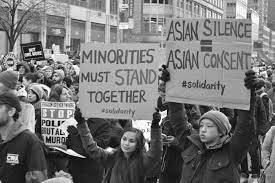Written by Bradley Bommarito
Since the beginning of the COVID-19 pandemic last March, the Asian American community in the U.S. has experienced a record amount of hate crimes and a renewed wave of xenophobia. According to a recent USA TODAY survey, 17 percent of Asian American respondents reported sexual harassment, stalking, physical threats and other incidents throughout 2020. This was an 11 percent spike from last year.
Harassment is not just limited to in-person interactions. The Anti-Defamation League (ADL) reported that 21 percent of Asian Americans surveyed experienced online harassment in the past year. The Center for the Study of Hate and Extremism at California State University has reported that hate crimes against Asian Americans have increased by 149 percent from 2019 to 2020, despite the fact that hate crimes in general have fallen by 7 percent since the onset of the pandemic.
The politicization of the COVID-19 pandemic has been the main driver of this renewed surge of hate and xenophobia. The introduction of new slurs such as “the China virus” and “the Kung Flu” has created a negative perception of the Asian American community and has placed a sense of unwarranted blame for the pandemic upon an entire group of people. The previous presidential administration originally popularized this harmful rhetoric, and it has since been adopted by fringe political factions and hate groups. The ADL found that Anti-Asian sentiment spiked 85 percent directly after President Trump was diagnosed with COVID-19 last fall.
Though the Biden administration has since released a presidential memorandum condemning this rhetoric, titled “Memorandum Condemning and Combating Racism, Xenophobia, and Intolerance Against Asian Americans and Pacific Islanders in the United States,” the legacy of the Trump administration’s handling of the pandemic continues to inspire xenophobia and hate crimes across the country. Recent tragedies have created a renewed sense of urgency in responding to increases in hate crimes.
A shooting at an Atlanta, Ga. massage parlor that claimed the lives of six women of Asian descent as well as two other people last week was originally suspected of being a hate crime. Other incidents this week, one involving an elderly victim in San Francisco, Ca., have led to further public outcry. The anti-hate forum Stop AAPI Hate has estimated that nearly 3,800 hate crimes against Asian-Americans have occurred this year alone, up sharply from around 2,600 incidents the previous year.
It has become clear that the pandemic and current political tensions continue to inspire increased attacks on the Asian American community. In the next issue, the Brackety-Ack will explore responses from the Asian American community locally and look at ways of pushing back against this wave of xenophobia and hatred.




